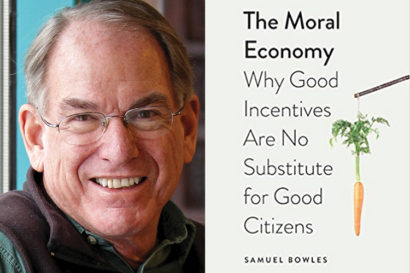Berkeley Talks: Economist Samuel Bowles on why good incentives are no substitute for good citizens
Samuel Bowles, a research professor and director of the Behavioral Sciences Program at the Santa Fe Institute in Santa Fe, New Mexico, spoke in February as part of UC Berkeley's 2019 Barbara Weinstock Lectures on the Morals of Trade.
August 5, 2019
Subscribe to Berkeley Talks, a Berkeley News podcast that features lectures and conversations at UC Berkeley.

Samuel Bowles is a research professor and director of the Behavioral Sciences Program at the Santa Fe Institute in Santa Fe, New Mexico.
“It is widely held today on grounds of prudence — if not realism — that in designing public policy and legal systems, we should assume that people are entirely self-interested and amoral. But it is anything but prudent to let Homo economicus be the behavioral assumption that underpins public policy,” says Samuel Bowles, a research professor and director of the Behavioral Sciences Program at the Santa Fe Institute in Santa Fe, New Mexico. He explains why this is so, using evidence from behavioral experiments mechanism design and other sources, and proposes an alternative paradigm for policy making.
Sponsored by UC Berkeley’s Graduate Division, Bowles presented this lecture on Feb. 25, 2019, as part of the Barbara Weinstock Lectures on the Morals of Trade.
In 1902, Harris Weinstock, a well-known businessman of Sacramento, California, provided the University of California with a fund to support an annual public lecture on the morals of trade, on behalf of his wife Barbara. Weinstock summed up his reasons for this decision in an article he wrote after the first lecture was delivered in 1904: “Thus, hope is in the air and there is a better and cleaner day in store for all destined to spend their lives in commercial pursuits. The thing to do at this hour is to accelerate the movement and to bring this hoped for day as near to our own as possible. The California University lectureship on the moral of trade is a small effort in that direction.”
Bowles’ most recent book is The Moral Economy: Why Good Laws are no Substitute for Good Citizens (2017). His other publications include A Cooperative Species: Human reciprocity and its evolution (2013) and Microeconomics: Behavior, Institutions and Evolution (2006). He is currently working on Equality’s Moment: The Origins and Future of Economic Disparity and Political Hierarchy.
With a global team of researchers and teachers, he developed a new introduction to economics that demonstrates the power of modern economics to illuminate problems such as growing inequality, climate change, innovation, wealth creation and instability. The year-long, highly interactive e-text, called The Economy, is open-access and freely available to anyone in the world with internet connectivity on their phone or other device at www.core-econ.org.
This lecture was produced by University of California Television (UCTV), a public-serving media outlet featuring programming from throughout the University of California.